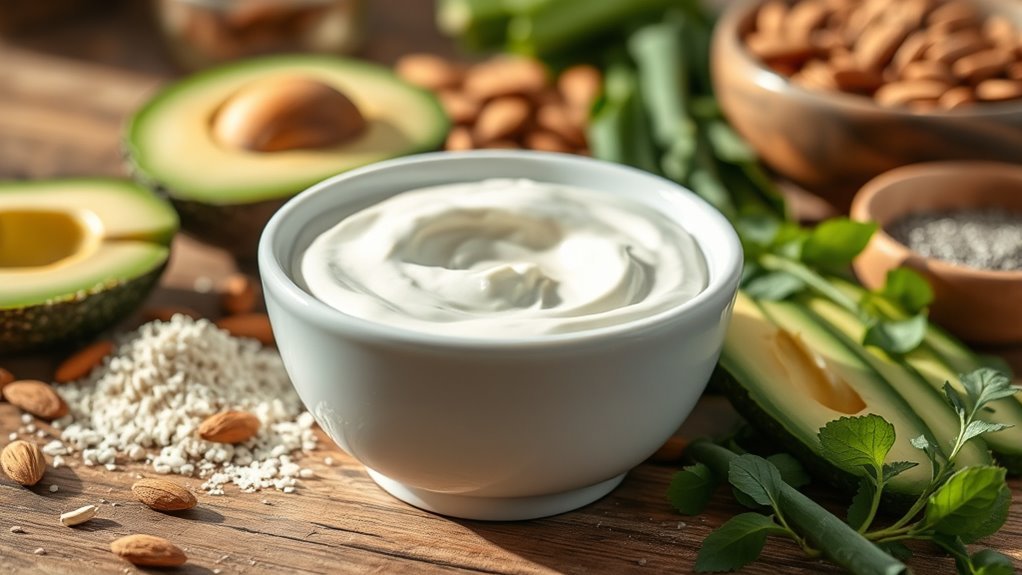Yes, xanthan gum is keto-friendly! It contains about 7 grams of total carbs per tablespoon, with roughly 6 grams being dietary fiber, leading to just 1 gram of net carbs. This makes it an excellent thickening agent in low-carb recipes without greatly impacting your daily carb count. Plus, it can enhance textures and moisture in foods. If you’re curious about its health benefits and how to incorporate it into your cooking, there’s more to discover.
What Is Xanthan Gum?

Xanthan gum is a popular food additive derived from the fermentation of sugars by the bacterium Xanthomonas campestris. Its origins date back to the 1960s, when it was first developed as a thickening and stabilizing agent. You’ll find xanthan gum used in a variety of products, ranging from salad dressings to gluten-free baked goods. It helps to improve texture and maintain consistency, making it a valuable ingredient for those looking to enhance their culinary creations without gluten. Additionally, xanthan gum serves as a fat replacer in low-calorie formulations and can also be found in personal care items. Understanding xanthan gum’s origins and uses can empower you to make informed choices in your diet and lifestyle.
Nutritional Profile of Xanthan Gum

When considering xanthan gum’s nutritional profile, it’s important to analyze its carbohydrate content, especially in the context of a keto diet. While it does contain carbs, most of them come from soluble fiber, which means the net carb count is very low. Additionally, xanthan gum offers various nutritional benefits that can enhance your cooking and baking without greatly impacting your carb intake. Limiting carbs is crucial for maintaining ketosis, and xanthan gum can be a useful ingredient in low-carb recipes.
Carb Content Analysis
Although many people may wonder about the suitability of xanthan gum on a keto diet, its carb content is surprisingly low. Xanthan gum is an excellent option for those seeking keto alternatives to traditional thickening agents.
Here’s a brief overview of its nutritional profile:
- Total Carbohydrates: Approximately 7 grams per tablespoon
- Dietary Fiber: Roughly 6 grams, contributing to its low net carb count
- Net Carbs: Only about 1 gram per tablespoon, making it a viable choice
- Usage: Used sparingly, it won’t greatly impact your daily carb sources
This low carb content allows you to enjoy the benefits of xanthan gum without derailing your keto lifestyle. Incorporating it into your meals can enhance texture without adding excess carbs.
Fiber vs. Net Carbs
While many people focus on total carbohydrates when evaluating food options for a keto diet, understanding the distinction between fiber and net carbs is essential. Xanthan gum, a popular thickening agent, contains soluble fiber, which doesn’t greatly impact blood sugar levels. When calculating net carbs, you can subtract fiber from total carbs, giving you a clearer picture of how a food will affect your body. For those on a keto diet, knowing fiber sources helps you maintain your carbohydrate limits while still enjoying a variety of foods. In the case of xanthan gum, its negligible net carbs make it a suitable choice, allowing you to enhance your recipes without compromising your dietary goals. Additionally, incorporating healthy fats and oils into your meals can further support your ketogenic lifestyle.
Nutritional Benefits Overview
Understanding the nutritional profile of xanthan gum reveals why it’s a favored ingredient in many keto-friendly recipes. This versatile thickener not only enhances texture but also offers several health benefits, making it a smart choice for your culinary applications.
- Low in calories: Xanthan gum has virtually no calories, making it ideal for calorie-conscious diets.
- High in soluble fiber: It aids digestion and promotes gut health.
- Gluten-free alternative: Perfect for those with gluten sensitivities or celiac disease.
- Stabilizes emulsions: Helps maintain the consistency of sauces, dressings, and baked goods.
Incorporating xanthan gum into your recipes can elevate your meals while supporting your health goals. Enjoy the freedom to create delicious dishes without compromising your dietary preferences!
How Xanthan Gum Fits Into a Keto Diet

When considering how xanthan gum fits into your keto diet, it’s important to analyze its carb content, which is minimal and often negligible in recipes. As a thickening agent, it can enhance the texture of low-carb meals without adding significant calories or carbs. Additionally, xanthan gum may support digestive health, making it a beneficial choice for those following a ketogenic lifestyle.
Carb Content Analysis
Although you might be concerned about carb intake on a keto diet, xanthan gum actually has a negligible carbohydrate content that makes it a suitable thickening agent. It’s important to evaluate how xanthan gum can fit among your carb sources and keto alternatives.
Here are a few key points:
- Contains about 0.5 grams of carbs per teaspoon
- Utilized in small amounts, minimizing carb impact
- Can replace higher-carb thickeners like flour or cornstarch
- Enhances texture without compromising your keto goals
Incorporating xanthan gum into your meals allows you to maintain the desired consistency while staying within your carb limits. This makes it an excellent choice for those who want to enjoy a variety of low-carb dishes without sacrificing flavor or texture.
Thickening Agent Benefits
Xanthan gum serves as a highly effective thickening agent that fits seamlessly into a keto diet. Its thickening properties make it ideal for a variety of culinary applications, from sauces to baked goods. By using xanthan gum, you can achieve the desired texture without adding unnecessary carbs or calories, allowing you to maintain your dietary goals.
Here’s a quick overview of xanthan gum’s benefits:
| Benefit | Description | Culinary Application |
|---|---|---|
| Thickening Properties | Enhances texture without carbs | Soups and sauces |
| Emulsification | Stabilizes mixtures | Salad dressings |
| Gluten-Free | Ideal for those avoiding gluten | Baked goods |
| Low Calorie | Minimal impact on calorie count | Smoothies |
| Versatile | Works in various recipes | Ice creams, gravies |
Incorporating xanthan gum can elevate your meals while keeping them keto-friendly.
Digestive Health Considerations
While many people are concerned about the impact of certain ingredients on digestive health, xanthan gum can actually offer benefits for those following a keto diet. This thickening agent may help improve gut health and mitigate some common digestive issues associated with low-carb eating.
- Acts as a soluble fiber, promoting regularity
- Supports the growth of beneficial gut bacteria
- Can reduce symptoms of irritable bowel syndrome (IBS)
- Helps maintain a feeling of fullness, aiding in weight management
Incorporating xanthan gum into your meals may enhance your keto experience without compromising your digestive well-being. As always, it’s wise to monitor your body’s response, as individual tolerances can vary. Enjoy the freedom of exploring new textures and flavors while prioritizing digestive health!
Potential Health Benefits of Xanthan Gum
When considering dietary options, you might be interested to know that xanthan gum offers several potential health benefits. One of its primary advantages is its ability to provide digestive support. As a soluble fiber, xanthan gum can help regulate bowel movements and promote gut health. Research indicates that it may also assist in managing blood sugar levels, making it a favorable choice for those on low-carb diets.
Additionally, xanthan gum can enhance the texture of foods, which may lead to greater satisfaction and reduced cravings. It’s low in calories and can make meals more enjoyable without compromising your dietary goals. Overall, incorporating xanthan gum might contribute positively to your health journey, especially if you’re seeking balance and freedom in your eating habits.
How to Use Xanthan Gum in Keto Recipes
If you’re looking to enhance your keto recipes, xanthan gum can be a game-changer. This versatile ingredient adds texture and stability to your dishes, making it ideal for various xanthan applications. Here’s how to effectively use xanthan gum in keto baking:
- Thickening sauces: It’s perfect for creating creamy textures without extra carbs.
- Binding agents: Use it in gluten-free flours to improve dough elasticity.
- Stabilizing dressings: Keep your homemade salad dressings smooth and consistent.
- Enhancing moisture: Prevent dryness in baked goods, ensuring they stay fresh longer.
Incorporating xanthan gum into your keto recipes not only boosts their quality but also allows you to enjoy delicious, satisfying meals while staying true to your dietary goals.
Possible Side Effects and Considerations
Though xanthan gum is generally safe for most people, it’s important to be aware of potential side effects and considerations. Some individuals may experience digestive issues, especially when consuming large amounts. Below is a summary of possible side effects:
| Side Effects | Considerations |
|---|---|
| Bloating | Start with small amounts |
| Gas | Monitor your body’s response |
| Diarrhea | Consult a healthcare provider |
If you’re sensitive to gums or have a history of digestive problems, you might want to limit your intake. Always listen to your body and adjust as needed. Xanthan gum can be a great addition to your keto lifestyle, but awareness of its effects can help you enjoy it safely.
Frequently Asked Questions
Can I Substitute Xanthan Gum With Other Thickeners on Keto?
Yes, you can substitute xanthan gum with other alternative thickeners in your keto recipes. Some good options include psyllium husk, chia seeds, or guar gum, each offering unique thickening properties. Just keep in mind that the texture and taste may vary slightly. Experimenting with these alternatives can give you the freedom to create delicious, keto-friendly dishes while still achieving the desired consistency in your meals. Enjoy your cooking!
Is Xanthan Gum Safe for People With Gluten Intolerance?
Absolutely, xanthan gum is safe for you if you have gluten intolerance. Think of it as a sturdy bridge, allowing your dishes to hold together without the need for gluten. The benefits of xanthan gum include its ability to thicken and stabilize your recipes, making it a great alternative. Just remember, it’s derived from fermented sugars, so it won’t trigger gluten-related issues while helping you create delicious, satisfying meals. Enjoy the freedom of your culinary creations!
Does Xanthan Gum Have Any Impact on Blood Sugar Levels?
Xanthan gum doesn’t have a significant impact on blood sugar levels. It’s a soluble fiber that can actually help stabilize blood sugar by slowing digestion and absorption of carbohydrates. When you use xanthan gum in recipes, it thins out the food without contributing to sugar spikes. Just remember, it’s always a good idea to monitor how your body responds, especially if you’re managing conditions like diabetes.
How Much Xanthan Gum Can I Safely Consume Daily?
You might think you can’t overdo it with xanthan gum, but moderation’s key! The recommended dosage for daily intake is about 1 to 2 teaspoons. Going beyond that can lead to digestive issues, which isn’t the freedom you’re looking for. So, while it’s a fantastic thickening agent, keep your consumption in check to enjoy its benefits without the unwanted side effects. Balance is everything, even in the world of keto-friendly ingredients!
Can Xanthan Gum Cause Digestive Issues for Some Individuals?
Yes, xanthan gum can cause digestive discomfort for some individuals, especially those with individual sensitivity to it. While it’s generally recognized as safe, consuming large amounts may lead to gas, bloating, or diarrhea. If you’re trying it for the first time, start with a small amount to gauge your body’s reaction. Listening to your body is key, as everyone’s digestive system reacts differently to additives like xanthan gum.
Frequently Asked Questions about Xanthan Gum and the Keto Diet
1. Is xanthan gum keto-friendly?
Yes, xanthan gum is considered keto-friendly. It is a low-calorie thickening agent derived from fermented sugars. It contains negligible carbohydrates, making it suitable for those following a ketogenic diet, which typically restricts carbohydrate intake to achieve ketosis.
2. What are the benefits of using xanthan gum on a keto diet?
Xanthan gum serves several purposes in a keto diet. It acts as a thickener, stabilizer, and emulsifier, allowing the creation of creamy sauces, dressings, and baked goods without the added carbohydrates found in traditional flour or sugar. Additionally, it helps improve the texture and mouthfeel of keto-friendly recipes.
3. How much xanthan gum can I use in my keto recipes?
The general recommendation is to use xanthan gum in moderation. Typically, 1/4 to 1 teaspoon per cup of liquid is sufficient to achieve the desired thickness. However, it’s best to start with a small amount and adjust to taste, as xanthan gum can become overly thick if too much is added.
4. Are there any side effects of consuming xanthan gum on a keto diet?
For most people, xanthan gum is safe to consume in moderation. However, some individuals may experience digestive issues, such as bloating or gas, especially if they are sensitive to fiber or consume it in large quantities. If you are new to using xanthan gum, start with small amounts to see how your body reacts.
5. Can I substitute xanthan gum with other thickeners on a keto diet?
Yes, there are several keto-friendly alternatives to xanthan gum, including guar gum, psyllium husk powder, and arrowroot powder. Each of these substitutes has unique properties, so you may need to experiment with the quantities to achieve the desired thickness and texture in your recipes. Keep in mind that some alternatives may have slightly different carb counts.
References
- https://en.wikipedia.org/wiki/Xanthan_gum
- https://www.ncbi.nlm.nih.gov/pmc/articles/PMC6613524/
- https://www.healthline.com/nutrition/xanthan-gum
- https://www.ncbi.nlm.nih.gov/pmc/articles/PMC4798601/
- https://www.cdc.gov/nutrition/foodallergies/food-additives.html
- https://www.sciencedirect.com/topics/agricultural-and-biological-sciences/xanthan-gum


